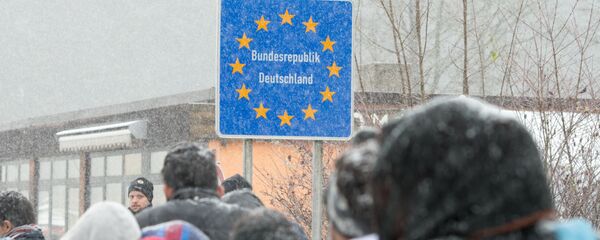This week, Germany's Interior Ministry released its 2016 crime figures, showing a dramatic increase in violent crime, including a 14.3% rise in murder and manslaughter, a 12.7% rise in rape and sexual assaults, and a 9.9% increase in serious assaults over the previous year. The figures showed that illegal immigrants, refugees and asylum seekers were suspected of having committing 174,438 crimes, a whopping 52.7% increase over the previous year.
Germany watchers say there's a clear connection between this increase in crime and Chancellor Angela Merkel's open door policy toward immigrants. German media, meanwhile, is considering whether the statistics will affect her chances in September's parliamentary elections.

Commenting on the migrant crisis facing Germany and the rest of Europe, RIA Novosti contributor and Europe observer Igor Pshenichnikov recalled that "observing the situation with refugees in Europe over the last ten or fifteen years, it can be argued that the authorities of European countries did not set out to confront the influx of immigrants."
"The Europeans continued to operate under this paradigm even at the moment, two years ago, when the flow of migrants suddenly turned into a tsunami, in connection with the wars in Libya, Syria and Iraq. It took some time before German authorities, who showed the most favorable attitudes toward immigrants, came to realize the mistake they made in 2015, when they declared all migrants welcome."
But chalking it all down to some kind of' mistake' isn't correct, Pshenichnikov noted. Behind Berlin's logic were macroeconomic calculations which went beyond the interests of ordinary Germans.
The report explained that Germany's current fertility rates – 160 births per 100 women, was far below that which would be necessary to reproduce the population (which requires a fertility rate of 210 children per 100 women). Accordingly, the German government calculated that the country 'needs' an estimated 300,000 migrants new migrants each year, in order to preserve economic stability up to 2060.

"It's obvious," Pshenichnikov noted, "that without laborers the economy will not work."
"But it's not so difficult to imagine what this will all lead to by 2060, either. If Chancellor Merkel's macroeconomic calculations are correct, the German economy will not experience shortages to its working population." However, if the migration trends continue, by the time 2060 rolls around, "there will be much fewer actual Germans, for whom all this is all supposedly being calculated, than there are today."
Even the simplest calculation of 300,000 migrants per year means over 12 million new arrivals by 2060 to complement Germany's population of 81 million. "But this calculation does not consider the difference in birthrates between Germans and migrants, nor the fact that in 2015-2016 alone, Berlin had 'fulfilled its migration plan' for nearly a decade."
These trends threaten to bring with them tectonic changes to Germany's ethnic, culture and religious traditions as well, Pshenichnikov stressed. Today, the analyst recalled, like most EU members, Germany is facing the lowest birthrates in its history. "One of the main reasons for this…is the radical change" that has been observed "in Europe's cultural and religious traditions, or rather, their dissolution into the semi-official ideology of urban individualism," he added.
The resulting clash between the cultural, social and religious norms that these people bring with them and those of Germany's native population inevitably lead to misunderstandings and conflicts, the analyst added.
"For instance, why did the immigrants show themselves in such a striking manner during last year's New Year's Eve celebrations in Germany – particularly in the infamous Cologne 'night of rape'? Because they were brought up in different, more severe traditions, and consider Europeans, with their gender freedoms, to be [a civilization that is] 'finished', from the moral standpoint, and thus not deserving of respect."
Pshenichnikov emphasized that it's "for the same reason that it doesn't seem likely that immigrants will mix significantly with the Europeans: the gulf between the cultures and religions of the East and Europe is simply too wide. The newcomers not only do not wish to be integrated into the local culture; they deeply despise it as something decadent and declining."
The question, Pshenichnikov laments, is "who will this economic capital be left to?"

